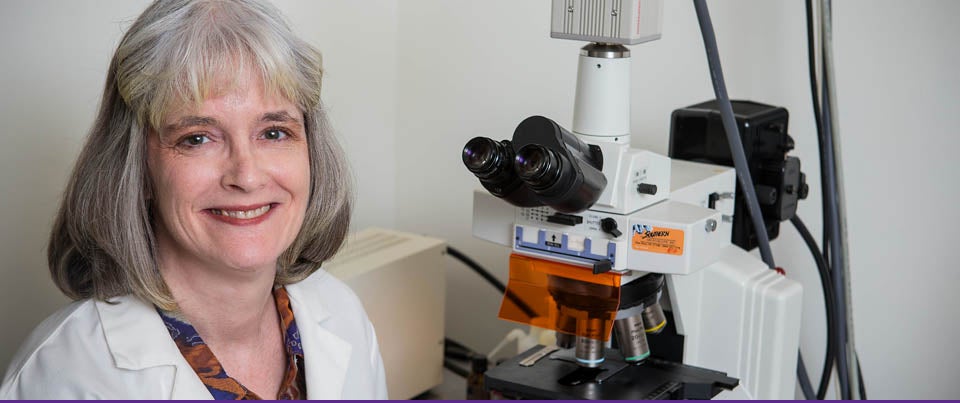THREE-YEAR GRANT
Brody professor awarded $300,000 to study protein she discovered
An East Carolina University researcher has been awarded a $300,000 grant to study a cellular protein long overlooked by scientists.
Dr. Ann Sperry, associate professor in the Department of Anatomy and Cell Biology at the Brody School of Medicine, received the three-year Academic Research Enhancement Award from the National Institutes of Health. She will use the funding to study how a certain protein affects the functions of a cell’s centrosome – the structure within a cell that regulates vital processes like cell division and development.
Sperry identified the protein, named PPP1R42, three years ago, but just recently discovered it plays a role in regulating the centrosome. “No one else we know is studying this protein,” she said.
Sperry said the protein is found in a wide variety of cell types, including photoreceptor cells in the eye and developing sperm cells in the male reproductive system.
“Centrosomes help cells read their environment and then develop accordingly,” she said. “When centrosomes aren’t working properly, you get genetic mutations, which can be associated with things like male infertility, genetic diseases and even cancer.”
Assisted by two undergraduate students, Sperry hopes to discover whether PPP1R42 could potentially be used as a marker for such diseases, and perhaps even for their prevention or treatment.
The purpose of the AREA program, according to the NIH website, is “to stimulate research in educational institutions that provide baccalaureate or advanced degrees for a significant number of the nation’s research scientists, but that have not been major recipients of NIH support.” The program aims to “expose students to meritorious research projects and to strengthen the research environment of the applicant institution,” the site says.
Dr. Cheryl Knudson, chair of the Department of Anatomy and Cell Biology, said Sperry “is an outstanding student mentor.” Her research will impact our understanding of the primary cilia associated with the centrosome – a critical organelle facilitating the interaction between the cell and its environment.”
Sperry has been with ECU for 17 years. She received her undergraduate degree from Texas A&M University and her doctorate from Rice University in Houston.
